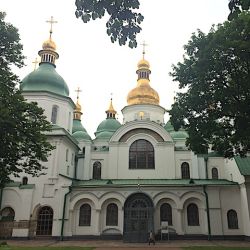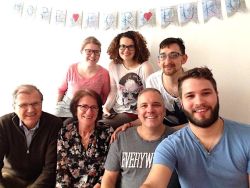It is Taras Dmytryk with whom Martin Hoegger lived a week of retreat in Estonia in July 2016 as part of the International and Interdenominational Association of Religious Men and Women.
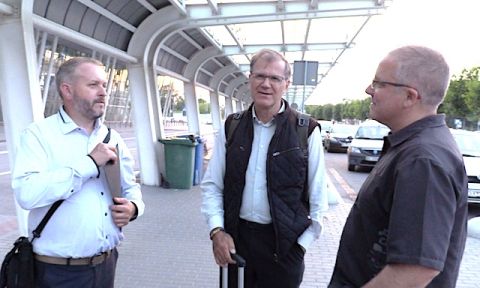 Taras Dmytryk Martin Hoegger and Olivier Fleury
Taras Dmytryk Martin Hoegger and Olivier Fleury
Taras works at the Institute of Ecumenical Studies in Lviv and speaks excellent French. He teaches at the university. He leads us to the newly opened hotel, by the Greek Catholic Church. A pleasant and comfortable place on the edge of town looking over a small lake (see photo above).
The next morning, we begin the day with a meditation of Psalm 118, which speaks of a door, a corner stone and an altar. Three symbols that announce the work of the Messiah: he opens a new way to God (the door), he gathers humanity in him (the cornerstone) and gives his life (the altar). We ask Christ to live in us during these intense days of visits: that he opens the doors and gathers people around his resurrection!
We then participate in the liturgy of Pentecost Monday in the beautiful Church of the Greek Catholic Seminary, a few meters from our place of residence and are struck by the beauty of the songs, sung by about forty young seminarians.
JC2033 and interdenominational training
It is another Taras who leads us to the Institute of Ecumenical Studies: Taras Kurylets, professor of this Institute connected to the Catholic University of the Ukraine. It is he who, through the intermediary of Antoine Arjakovsky, founder of this Institute and currently professor at the Collège des Bernardins in Paris, organized our various visits in this city.
He takes his time to explains us the complex history of the Ukraine and the current relations between the churches: “A bridge country between East and West, for art, churches, culture, politics. A difficult field from the ecumenical point of view but full of promise”. Regarding the JC2033 project, he appreciates its ecumenical and missiological dimension: “In the prayer of Jesus in John 17, there is a close relationship between unity and mission. This is particularly important if you want to reach the youngest”.
We will meet T. Kurylets from Wednesday as part of the Kiev Ecumenical Social Week, organized by this dynamic Ecumenical Institute.
We should have visited the Greek Catholic Archbishop Igor, but he had to go to Kiev to attend the funeral of Cardinal Husar, a leading figure of this Church and of the Ukraine in general.
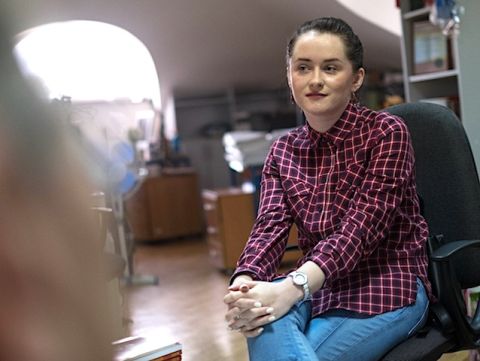 Lidia Batih
Lidia Batih
So Lidia Batih, a very active journalist on the Lviv scene, joins us. She animates an interfaith media program and gives a voice to the various churches and maintains good relations with them. She has just been involved in founding a school of interreligious journalism, particularly appreciated by the Jews recently returned to this city whose community had been decimated during the Nazi occupation.
An intense ecumenical life of celebrations, meetings and conferences is taking place in Lviv. The interconfessional dimension of JC2033 appeals to her right away and she sees the potential of such a vision to speak to young people: “Many young people would like to be closer to the Church, but they find it difficult to join her because of the forms they don’t know”.
We then receive the visit of Professor Roman Solovij. Former Rector of the Pentecostal Seminary, he is connected to the Ecumenical Institute and coordinates an international association of theological education: the “Euro-Asian Accrediting Association”. An association that serves not only the 1500 Churches of the Pentecostal Union and the 2000 Churches the Baptist Union in the Ukraine but also other countries of the former Soviet Union.
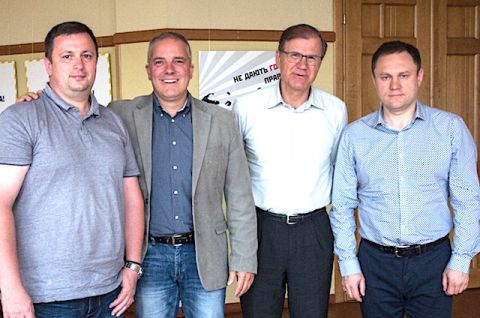 On the left, Taras Kurylets. On the right, Roman Solovij
On the left, Taras Kurylets. On the right, Roman Solovij
“Our association works with Christians from various churches. We are interested in collaborating on your project. It will affect more young people than the older ones, some of whom are conservative”, he says. He advises us to translate all material into Ukrainian and Russian and to plan an annual event to be reminded of this project. “As we are drowned by the flow of information, it is essential to constantly remind, motivate and inspire”. He also wishes to invite us to a general meeting of his Association to speak to the head teachers of the Eastern countries.
Taras takes us to visit the beautiful city of Lviv where we discover all its cultural and religious diversity. Truly a laboratory for Christian unity, between East and West!
Churches, witnesses in the city
The next day we meet two other actors of unity in Lviv. Firstly, Taras Dziubanskyj, founder of the "Libertas" platform for ecumenical and interreligious dialogue. He advises us to see the mayor of the city on these issues as well as the Chamber of Commerce on ethical issues, for example the issue of corruption, which is crucial in the Ukraine. Of Greek Catholic confession, he coordinates an international group of students of the Angelicum (a great Roman university) around interreligious dialogue.
In front of the ruins of the Great Synagogue we interview him on JC2033: “This is a very good initiative that will allow all Christians to witness their faith in the resurrection of Christ which unites us all. We are called to be his witnesses not only in our own communities, but everywhere we live, work”.
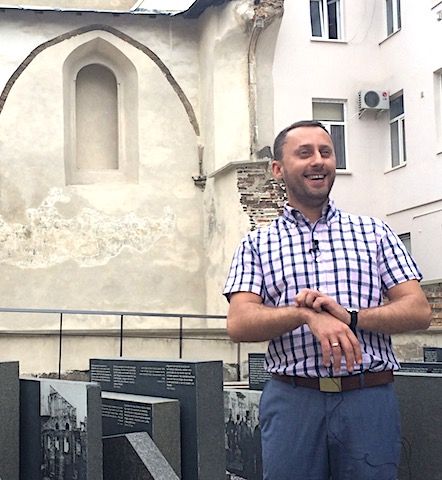 Taras Dziubanskyj
Taras Dziubanskyj
With him we meet Ivan Spodar, a deacon of the Orthodox Church (Kyiv Patriarchate) who works with the Lviv City Council for relations with the churches. They live a beautiful collaboration indeed with the town hall; under his guidance, a local council brings church leaders together twice a year.
A chaplain at the town hall leads the prayer at the beginning of each council session. Events to support poor families with the help of churches are organized. Thus, at Easter the town hall gives food that will be blessed during the Easter celebrations.
The children's summer camps organized by the churches are subsidized. The city council also consults youth organizations on social, educational and pilgrimage issues. Lviv is the city where the greatest cooperation among churches in the Ukraine is taking place. They are numerous: more than a hundred! And the municipality supports their charitable and integrative actions.
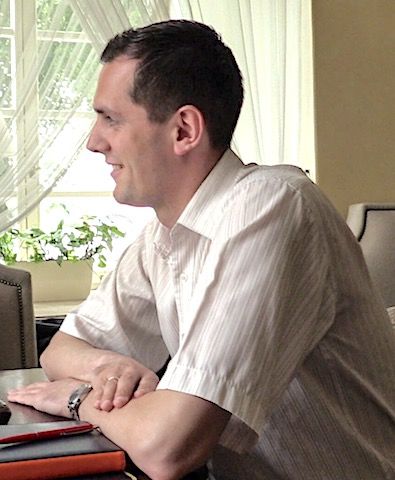 Ivan Spodar
Ivan Spodar
“Certainly in 2033, she will get involved. But the essential thing is for the churches to explain the meaning of the event”.
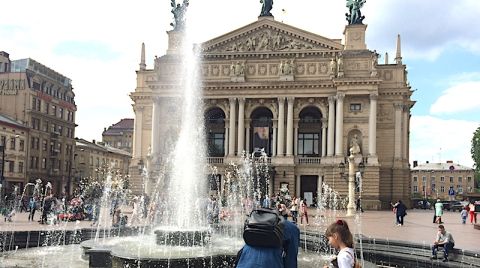 Lviv Opera Square
Lviv Opera Square


